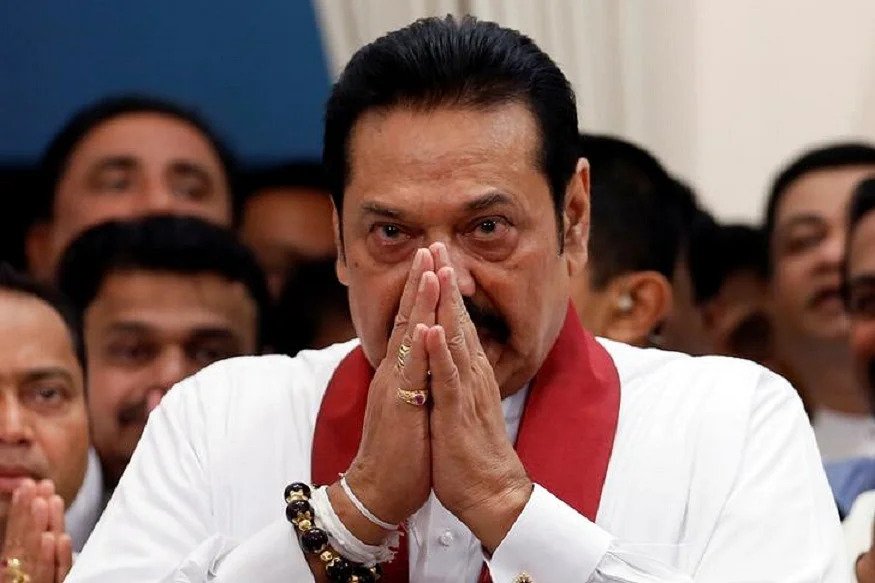Sri Lanka’s Prime Minister Mahinda Rajapaksa’s resignation submitted to President Gotabaya Rajapaksa, his younger brother, is but a desperate attempt by the ruling family to appease an infuriated population reeling under extreme economic hardships. The resignation followed violence that erupted when supporters of the ruling party attacked protesters at a site outside the presidential office in Colombo recently. This shows the hostile mood of the people and the ruling clan is left with no other option but to concede the demand for installation of an all-party government. Reports claim at least 78 people were injured in the unprovoked attack on peaceful protesters. Meanwhile, curfew has been imposed across the island nation of 22 million people after the violence.
Mahinda Rajapaksa’s spokesman Rohan Weliwita said the 76-year-old leader sent his resignation to clear the way for a “new unity government” suggested by the President to fight the country’s worst economic crisis since independence from British rule in 1948.
The mood of the people on the verge of starvation due to the colossal economic mismanagement by the government suggests sacrificing the Prime Minister for the President’s survival is not something that they want. The popular demand is for the resignation of both the PM and the President as is reflected in the two no-confidence motions brought by the Opposition party, Samagi Jana Balawegaya (SJB). Interestingly, the resignation came the day the date for taking up the two motions was to be fixed at a meeting under the chairmanship of Speaker Mahinda Yapa Abeywardena at the Parliament Complex. The Speaker had already announced a number of issues, including the current crisis in the country, would be discussed. It might be that the ruling family had realised the motions could be passed despite the re-election of Ranjith Siyambalapitiya as Deputy Speaker backed by MPs belonging to the ruling party late last week. This is because the Deputy Speaker had resigned within 24 hours of getting the votes of a majority of MPs.
The US ambassador to Sri Lanka condemned the violence against peaceful protesters and called on the government to conduct a full investigation, including the arrest and prosecution of anyone who incited violence. No wonder the President immediately tweeted, strongly condemning the violent acts by “those inciting and participating, irrespective of political allegiances.” Violence, he said, would not solve the current problems.
Truth is the violence could easily have been avoided. It is unfortunate that when Sri Lanka is plunged into the worst ever economic crisis, its parliament had to witness a theatre of the absurd. The need of the hour is to reform the island country’s political structure, form a credible inclusive government and overhaul its ravaged economy. Instead of confronting the crisis head-on, both the ruling party and the Opposition went about scoring over each other. The latest unseemly drama was the resignation, re-election and resignation of Siyambalapitiya from the post of Deputy Speaker in the span of only a few weeks. He had first resigned from the post April 5, paving the way for the election of a new Deputy Speaker after several parties, including the Sri Lanka Freedom Party, which he represented, became independent and joined the Opposition in parliament. His resignation after re-election could be in response to Opposition criticism that he had become a “government stooge” as ruling party MPs voted for him. However, he said, as if to explain his case, that he had expected to be a consensus candidate. This might have unnerved the ruling family and it feared losing power through the no-confidence motions.
Sri Lanka is facing a political and economic emergency due to government mismanagement. People have revolted against the government for its inept handling of the economy through widespread protests demanding immediate steps to bring down the spiraling food and energy prices. The country has now the world’s worst performing currency. In fact, Sri Lanka has been financially mismanaged for years. As a result, food inflation is running at 25 per cent and overall inflation at 18 per cent. This has led to dangerous shortages and a threat of starvation is staring at the country’s population of 22 million.
With shortages, power cuts for hours and nationwide protests, Opposition parties are cautiously trying to get a simple majority in the parliament needed to bring a no-confidence motion against the government of Rajapaksa. A draft bill that seeks to reform the current governance system, including abolishing the executive presidency and passing on its powers to the prime minister, has been presented in parliament. These are good signs for recovery.
The outcome of the voting for the election to the Deputy Speaker’s post prompted the Opposition Tamil National Alliance (TNA) MP Shanakiyan Rasamanickam to say that the “government-backed Deputy Speaker candidate revealed the likelihood of the government defeating the no-confidence motions.”
The Opposition decided to go ahead with the motions whatever the outcome in order to show to the people who among the MPs are ‘true patriots’ who can challenge the clout of the Rajapaksa family and come forward to save the country from the government’s ruinous economic policies.
It appears as if India, too, has reached a stage where it needs a verification of who the ‘true patriots’ are. The economy in this country is also crashing fast and, as with the Rajapaksa supporters resorting to violence in Sri Lanka, those who support the government here are finding trivial excuses to divert attention of the general public from intrinsically dangerous fallouts of wrong policy decisions that are impacting every sphere of life and activity.
